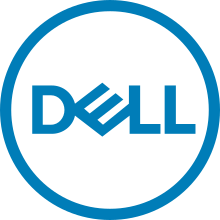Dell Technologies
|
Logo since October 2016. | |
 Headquarters | |
| Public | |
| Traded as |
NYSE: DVMT (Class V common stock – tracking stock for VMware) Russell 1000 Component |
| Industry | Information technology |
| Predecessor |
Dell EMC Corporation (now Dell EMC) |
| Founded | September 7, 2016 as a merger of EMC Corporation and Dell Inc. |
| Founder | Michael Dell |
| Headquarters | One Dell Way, Round Rock, Texas, U.S. |
Area served | Worldwide |
Key people |
Michael Dell (Chairman & CEO)[1] |
| Products |
|
| Revenue |
|
|
| |
|
| |
| Total assets |
|
| Total equity |
|
Number of employees | 138,000 (2017)[1] |
| Divisions |
Dell Client Solutions Group Dell EMC Infrastructure Solutions Group [1] |
| Subsidiaries |
SecureWorks Pivotal Software (70%) VMware |
| Website |
delltechnologies |
Dell Technologies Inc. is an American multinational information technology corporation based in Round Rock, Texas. It was formed as a result of the acquisition of Dell and EMC Corporation (which later became Dell EMC).[2]
Dell's products include personal computers, servers, smartphones, televisions, computer software, computer and network security, as well as information security services.[2]
Current operations
Approximately 50% of the company's revenue is derived in the United States.[1]
Dell operates under 3 divisions as follows:[1]
- Dell Client Solutions Group (60% of 2016 revenues) – produces desktop PCs, notebooks, tablets, and peripherals, such as monitors, printers, and projectors under the Dell brand name
- Dell EMC Infrastructure Solutions Group (35% of 2016 revenues) – storage solutions
- VMware (5% of 2016 revenues) – a publicly traded company focused on virtualization and cloud infrastructure
Dell also owns 4 separate businesses: RSA, Pivotal Software, SecureWorks, and Boomi, Inc.[1]
History
On October 12, 2015, Dell announced its intent to acquire the enterprise software and storage company EMC Corporation in a $67 billion transaction.[3] It was labeled the "highest-valued tech acquisition in history".[4]
In addition to Michael Dell, Singapore's Temasek Holdings and Silver Lake Partners were major Dell shareholders that supported the transaction.[5]
On September 7, 2016, Dell Inc. completed the merger with EMC Corp., which involved the issuance of $45.9 billion in debt and $4.4 billion common stock.[1][6]
The Dell Services, Dell Software Group, and the Dell EMC Enterprise Content Divisions were sold shortly thereafter for proceeds of $7.0 billion, which was used to repay debt.[1]In October 2017, It was reported that Dell would be investing $1 billion in IoT research and development.[7][8][9]
Dell acquisition of EMC
The announcement came two years after Dell Inc. returned to private ownership, claiming that it faced bleak prospects and would need several years out of the public eye to rebuild its business.[10] It's thought that the company's value has roughly doubled since then.[11] EMC was being pressured by Elliott Management, a hedge fund holding 2.2% of EMC's stock, to reorganize their unusual "Federation" structure, in which EMC's divisions were effectively being run as independent companies. Elliott argued[12] this structure deeply undervalued EMC's core "EMC II" data storage business, and that increasing competition between EMC II and VMware products was confusing the market and hindering both companies. The Wall Street Journal estimated that in 2014 Dell had revenue of $27.3 billion from personal computers and $8.9 billion from servers, while EMC had $16.5 billion from EMC II, $1bn from RSA Security, $6bn from VMware, and $230 million from Pivotal Software.[13] EMC owns around 80% of the stock of VMware.[14] The proposed acquisition will maintain VMware as a separate company, held via a new tracking stock, while the other parts of EMC will be rolled into Dell.[15] Once the acquisition closes Dell will again publish quarterly financial results, having ceased these on going private in 2013.[16]
The combined business is expected to address the markets for scale-out architecture, converged infrastructure and private cloud computing, playing to the strengths of both EMC and Dell.[13][17] Commentators have questioned the deal, with FBR Capital Markets saying that though it makes a "ton of sense" for Dell, it's a "nightmare scenario that would lack strategic synergies" for EMC.[18] Fortune said there was a lot for Dell to like in EMC's portfolio, but "does it all add up enough to justify tens of billions of dollars for the entire package? Probably not."[19] The Register reported the view of William Blair & Company that the merger would "blow up the current IT chess board", forcing other IT infrastructure vendors to restructure to achieve scale and vertical integration.[20] The value of VMware stock fell 10% after the announcement, valuing the deal at around $63–64bn rather than the $67bn originally reported.[21]
On January 29, 2018, it was reported that Dell Technologies was considering a reverse merger with its VMWare subsidiary in order to take the company public.[22]
References
- 1 2 3 4 5 6 7 8 9 10 11 12 13 Dell Technologies 2016 Form 10-K Annual Report
- 1 2 Shah, Agam (September 7, 2016). "The new Dell Technologies: 6 things you need to know". PC World.
- ↑ "Michael S. Dell, MSD Partners and Silver Lake Lead Transaction to Combine Dell and EMC, Creating Premier End-to-End Technology Company". Business Wire. October 12, 2015.
- ↑ "Dell agrees $67bn EMC takeover". BBC News. October 12, 2015.
- ↑ "BOOM: Dell to Acquire EMC for $67 Billion". Sovereign Wealth Fund Institute. October 12, 2015.
- ↑ "Historic Dell and EMC Merger Complete; Forms World's Largest Privately-Controlled Tech Company" (Press release). Business Wire. September 7, 2016.
- ↑ "Dell Technologies creates new IoT division as part of three-year, $1bn investment". www.businessreviewusa.com. Retrieved 2017-10-19.
- ↑ "Michael Dell Vows to Invest $1 Billion over Three Years to Fund Internet of Things Business". Fortune. Retrieved 2017-10-19.
- ↑ Moorhead, Patrick. "Dell Technologies IQT: Doubling Down On The Internet Of Things". Forbes. Retrieved 2017-10-19.
- ↑ "Dell Makes Case to Go Private in Grim Filing". The Wall Street Journal. March 29, 2013.
- ↑ David Benoit (October 12, 2015). "Dell's Value and the 'Falling Knife'". Wall Street Journal.
- ↑ "Elliott Management Sends Letter to Board of Directors of EMC Corporation". Business Wire. October 8, 2014.
- 1 2 "EMC Takeover Marks Return of Michael Dell". Wall Street Journal. October 13, 2015.
- ↑ "Dell-EMC: The empty shop". Financial Times. October 12, 2015.
- ↑ "Dell agrees $63bn acquisition of EMC". Financial Times. October 12, 2015.
- ↑ Brian Womack (October 21, 2015). "Dell CFO Reluctantly Accepts Public Disclosures With EMC Deal".
- ↑ "The merger of Dell and EMC stems from the rise of cloud computing". The Economist. October 12, 2015.
- ↑ Mike Stone (October 8, 2015). "Dell in talks to buy data storage company EMC: source". Reuters.
- ↑ Stacey Higginbotham (October 8, 2015). "A Dell-EMC deal doesn't make sense. Here's why". Fortune Magazine.
- ↑ "Dell hooking up with EMC and going public again? Come off it". The Register. October 9, 2015.
- ↑ Tom Braithwaite (October 13, 2015). "Dell-EMC deal: why VMware is falling". Financial Times.
- ↑ "VMware Plunges on Report It May Acquire Dell in Reverse Merger". Bloomberg.com. 2018-01-29. Retrieved 2018-01-29.

